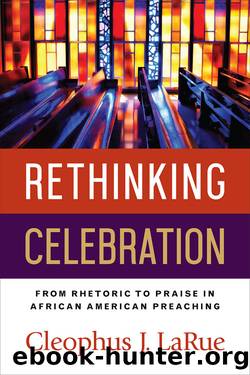Rethinking Celebration: From Rhetoric to Praise in African American Preaching by LaRue Cleophus J

Author:LaRue, Cleophus J.
Language: eng
Format: epub
Publisher: Westminster John Knox Press
Published: 2016-08-24T00:00:00+00:00
Ethical-Moral Endings
Ethical-moral endings are not specifically christological, but they have religious or ethical overtones. They pronounce a declaration of faith in God or in the words of Jesus.38 Claudette Copeland’s sermon titled “Tamar’s Torn Robe,” based on 2 Sam. 13:1–20, is an example of this type of ethical-moral ending.39 In this passage that depicts the troubles of King David in his own household, Absalom’s beautiful sister Tamar is coveted by Amnon, her half-brother who rapes her. From that moment on he expresses hatred for the girl he had abused. Copeland takes the story of this abused young woman to address the plight of women today who suffer from unhealthy family situations that have a negative impact on a woman’s physical, emotional, and spiritual health. She notes how women are negatively affected by a past they did not bargain for but assures them that God stands ready to help them undo the damage that has been done. In a deductive sermonic format Copeland lays out the moral framework for an abused woman’s path to wholeness: 1) She reminds women of God’s wholesome intentions for their lives; 2) warns them to beware of the collusion of some men in their hurt and pain; 3) draws a distinction between love and lust; 4) speaks of inherent dangers when a mother’s voice is absent; and 5) identifies the cry and the consequence of a woman in pain.
As she prepares to close the sermon Copeland reminds the women that like David, they can count on God to hear their cries: “David declares it thus: ‘Hear my cry, O God; attend unto my prayer. From the end of the earth will I cry unto thee, when my heart is overwhelmed; lead me to the rock [that] is higher than I” [Ps. 61:1 KJV]. Copeland then moves to her ethical-moral doxological close by admonishing women to cry unto God for help and healing. Says Copeland, “This is the good news: that whosoever calls on the name of the Lord shall be delivered. This is the good news!” She then makes a declaration of faith about her unshakeable faith in God. It constitutes an ethical-moral doxology:
Cry until a thousand poisoned rivers empty out. God is coming!
Cry until the rage gives way. God is listening.
Cry in prayer. God is about to restore.
Cry in therapy. God is sending help.
Cry at the altar. God will come with arms and a mighty embrace.
Cry until the confrontation arises. God will walk with you into a fearful past.
Cry until the truth makes you stronger than all your violators. Silence has protected the guilty too long.
Cry until you know the ear of the Lord has inclined toward you.
Cry out … there will be an answer. A healing answer. A restoring answer. An empowering answer. There will be someone to hear, someone to protect, someone to recover you of your affliction.
Copeland is clearly giving praise to God for God’s power to deliver. But this is no happy text chosen for its celebrative potential. It is a text filled with pain, dysfunction, and family intrigue.
Download
This site does not store any files on its server. We only index and link to content provided by other sites. Please contact the content providers to delete copyright contents if any and email us, we'll remove relevant links or contents immediately.
| Adult Ministry | Children's Ministry |
| Counseling & Recovery | Discipleship |
| Evangelism | Missions & Missionary Work |
| Preaching | Sermons |
| Youth Ministry |
The Rape Of Nanking by Iris Chang(2325)
The Secret Power of Speaking God's Word by Joyce Meyer(2253)
Chosen by God by R. C. Sproul(1760)
Crash the Chatterbox by Steven Furtick(1655)
Knowing God by J.I. Packer(1431)
Habits of Grace by David Mathis(1420)
How To Be Born Again by Billy Graham(1404)
A Prophet with Honor by William C. Martin(1373)
Peace with God by Billy Graham(1318)
God's Smuggler by Brother Andrew(1218)
Confronting Christianity by Rebecca McLaughlin(1193)
Whisper by Mark Batterson(1156)
Angel Dreams by Virtue Doreen Virtue Melissa(1140)
Missionaries by Norman Lewis(1135)
The Truth War by John MacArthur(1106)
The School of Biblical Evangelism by Ray Comfort(1100)
The Poems of Rowan Williams by Rowan Williams(1072)
Do Greater Things by Robby Dawkins(1046)
Eucharistic Miracles by Cruz Joan Carroll(1016)
